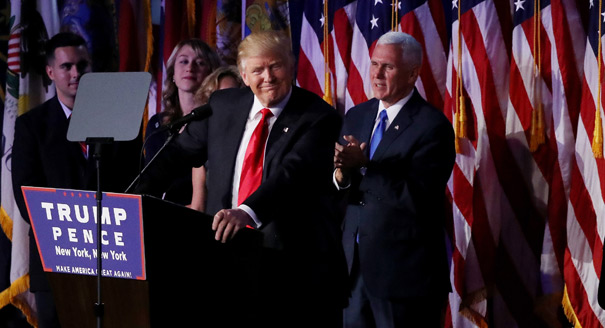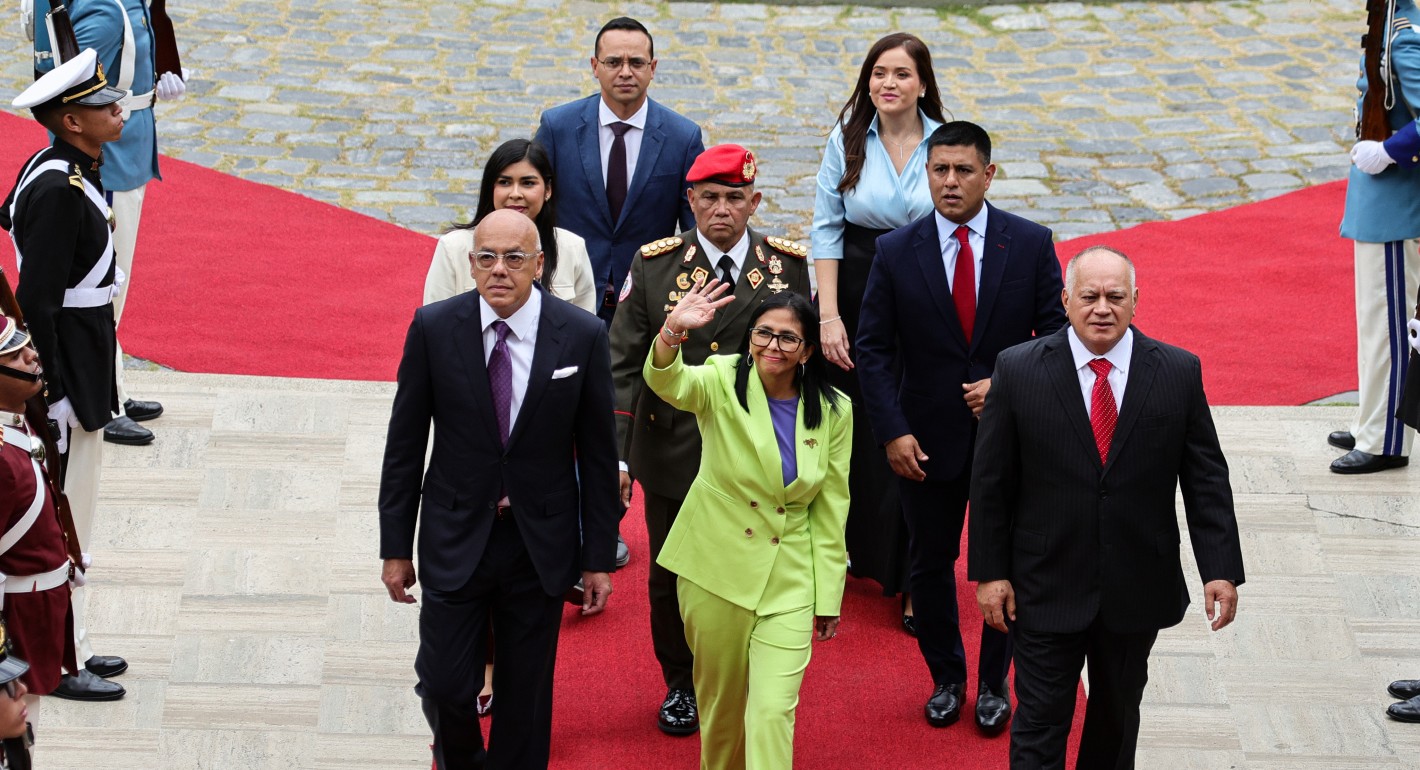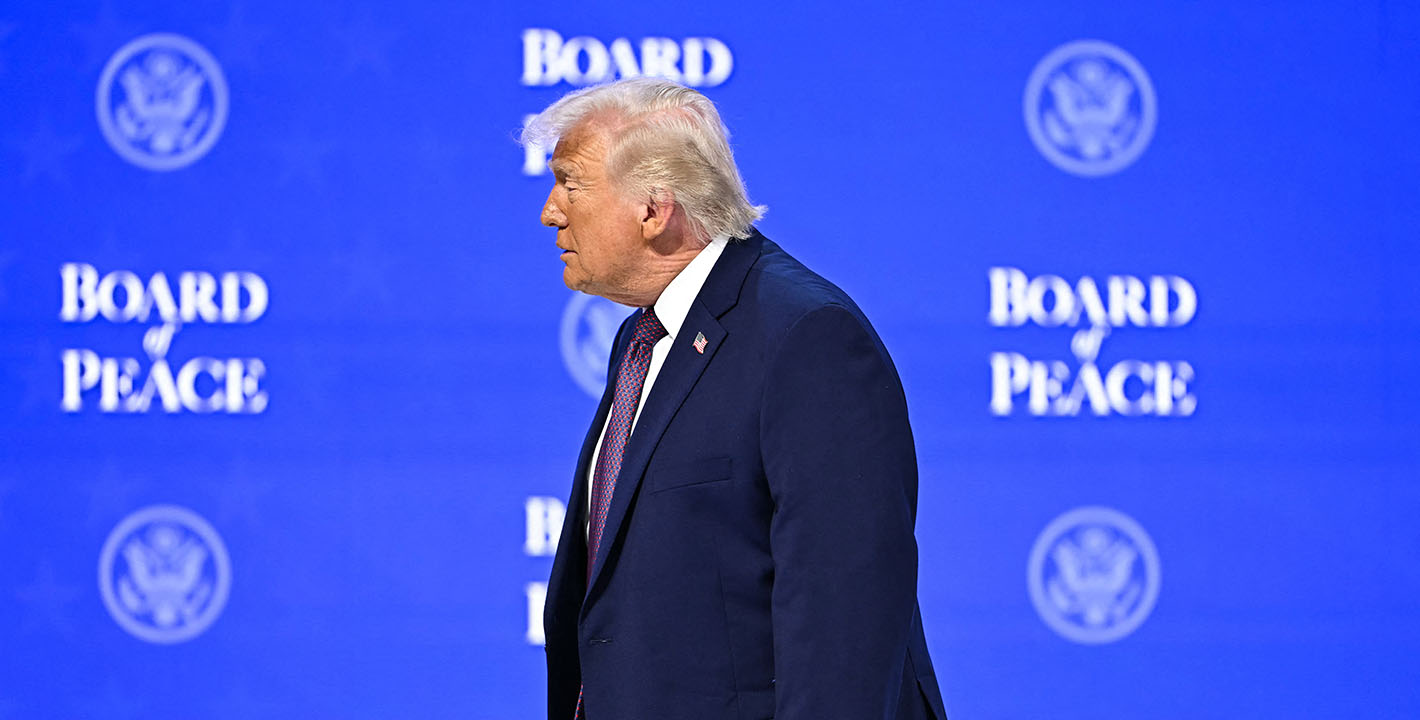Source: Foreign Policy
What a long, strange week it’s been. The slow-motion nightmare of last Tuesday night as the election results came in is still as fresh as though it had happened moments ago. The effort each day to find some perspective, to find a way to live with the results, has been a struggle. And then, late Sunday, Donald Trump began announcing his team and it became clear yet again: This is not business as usual. This is not just another candidate. President-elect Trump is a profound threat to the United States of America.
There was a moment of hope when he made a gracious acceptance speech. Perhaps the campaign rhetoric was just politics — vicious, dangerous, and deeply cynical — but perhaps he would moderate once he turned his attention to governing. But the events of the week have dispelled what little hope those remarks evoked. When protests against Trump took place, he had another of his Twitter tantrums, lashing out at citizens expressing their right to free speech and freedom of assembly, ominously yet again going after the media. Despite hundreds of incidents of violence and hate-speech that have occurred since his election, there has not been a single effort on the part of the president-elect to denounce the attacks — presumably because he very well knew they came from his alt-right supporters. What he did do, however, was announce that Steve Bannon — accused wife-beater, former Goldman Sachs banker, and one of the high priests of the alt-right movement as the CEO of Breitbart — would have a place of huge influence in his White House as his chief strategist.
I have studied how the White House and the executive branch of our government works most of my adult life. I’ve written two books on the subject and countless articles. And nothing says more about a president and the likelihood of success or failure of his administration than whom he picks as his closest advisors. More than any power mandated by the Constitution or by statute, it is the chemistry of the people who occupy the most important offices in the White House and the cabinet that determines the character and the direction of any administration.
What did Trump’s appointment of former Republican National Committee Chairman Reince Priebus as White House chief of staff and Bannon as counselor and chief strategist to the president tell us?
Priebus is a sop to the Republican establishment and in particular to his friend, fellow Wisconsinite Paul Ryan. Chief of staff can be a very important job. At times, when occupied by the likes of Sherman Adams or James Baker, it is a job that has been characterized as being “deputy president” or the second-most powerful person in the world. But other times, when occupied by people who were inexperienced, or when overseen by a neophyte president, or when the chief executive simply chose to empower others, the job can be devalued considerably. In this instance, Priebus has no real government experience, Trump has no real government experience, and Trump insiders have indicated that the president-elect had a predisposition to select Bannon for the job. (The announcement of both jobs at the same time and the fact that Bannon was given two titles — chief strategist and senior counselor — are indicative.)
Trump advisors who advocated for Priebus no doubt feel he sends a message of moderation, that he is not one of the extremist hate-mongers. The fact he is likely to be weak in the role and have a long learning curve undercuts that attempt at good faith. The fact that the hate monger-in-chief is sitting down the hall in the Valerie Jarrett Power-Behind-the-Throne suite makes the whole thing a transparent charade. “Ignore the man behind the curtain,” says the disembodied voice. Then it turns out that the man pulling the levers behind the curtain is the Wizard of Islamophobia, anti-Semitism, anti-woman, and anti-gay American hate media.
It is really hard to think of a senior White House appointment in modern history (maybe ever) who has as vile a track record as Bannon. Who knew we would be nostalgic for Dick Cheney and I. Lewis “Scooter” Libby so soon? Here are some Breitbart headlines of the recent past just to get you started: “Bill Kristol: Republican Spoiler, Renegade Jew,” “There’s No Hiring Bias Against Women in Tech, They Just Suck at Interviews,” “Gabby Giffords: The Gun Control Movement’s Human Shield,” “Planned Parenthood’s Body Count Under Cecile Richards Is Up to Half a Holocaust,” “Birth Control Makes Women Unattractive and Crazy,” “Roger Stone: Huma Abedin ‘Most Likely a Saudi Spy’ With ‘Deep, Inarguable Connections’ to ‘Global Terrorist Entity,’” “After the Pulse Club Massacre, It’s Time for Gays to Come Home to the Republican Party,” “The Solution to Online ‘Harassment’ Is Simple: Women Should Just Log Off,” “Data: Young Muslims in the West are a Ticking Time Bomb, Increasingly Sympathizing with Radicals, Terror,” and “NAACP Joins Soros Army Plotting DC Disruptions, Civil Disobedience, Mass Arrests.”
Bannon’s wife, in sworn testimony, accused her husband of anti-Semitism and saying he wanted to keep his daughters out of a certain school because he did not like Jews. She also filed a police report against him for assault that was later dropped. The average stationery store would not hire a guy with a record of such serial repulsiveness … but President-elect Trump wants him at his side. Of course, worse is that
Bannon, via Breitbart, led the alt-right/white supremacist/Ku Klux Klan messaging effort that helped put Trump in office and has led to the worst outbreak of hate attacks America has seen in recent memory. There is no group his actions or those of the organization he oversaw have not offended. But worse, there is no group to whom he is not a threat. (And I include Trump supporters in that. Remember, this is a former Goldman Sachs fat cat of the kind Trump was supposed to drain from the swamp.)
The message of the week is clear and only sharpened by a closer look at Trump’s transition team, which is chockablock with worrisome characters — from Lt. Gen. Michael Flynn (who was fired from his job at the Defense Intelligence Agency) to the weakest foreign-policy group I’ve ever seen fielded by a transition team. And the leaks regarding programs Trump is considering are also disturbing — notably an alleged plan to deport 3 million people as soon as possible after taking office.
I wanted to adjust to the new reality. I wanted to honor the choice of the American people. But even that has been made more difficult by the daily updates in the election totals. By the time the count is over, Hillary Clinton will have won the popular tally by over 1 million votes. George H.W. Bush will have been the last GOP president to enter office by actually having won the popular vote. Further, Clinton lost the three states that gave Trump the Electoral College win — Wisconsin, Michigan, and Pennsylvania — by only a few tens of thousands of votes each. It was that close. It was so close, in fact, that almost any explanation for why Trump was elected probably works.
Perhaps she was not the strongest candidate. (Her lower vote totals than President Barack Obama suggest this.) Certainly, her campaign foolishly under-focused on Wisconsin and Michigan, in particular with TV spending and campaign visits. The James Comey letter hurt … which means her decision to keep emails on a home server also hurt.
Another thing that undoubtedly hurt were Russia’s efforts to interfere with the election. Count the hack at the Democratic National Committee and the WikiLeaks campaign against Clinton among these. A foreign power sought to interfere in our elections and the response of the incoming president was to encourage it during the campaign … and to do likewise since. This week, he waxed effusively about the lovely note he received from Vladimir Putin congratulating him. (The only problem Putin probably had adjusting to this news is the hangover he and his team must have struggled with after their celebrations on election night. They could not have possibly imagined they would have been so successful … and with so few negative consequences.)
As I process this news, I ask myself: Is this just sour grapes because we here at FP felt Hillary Clinton was more qualified to be president? Certainly, there is disappointment. This was, in our judgment, a very dangerous outcome for the American people and the world. But my reactions this week have been much more than disappointment or residual unease. With each passing day, Trump has demonstrated that those characteristics and positions and people who made Trump and his team so odious during the campaign will continue while in office. Given the powers they will soon acquire, this is deeply disturbing.
While the period after an election is normally a honeymoon for the victors, and while we must honor the peaceful transition of power in our country, we cannot risk normalizing what is going on. Indeed, the normalization of the Trump candidacy by the media was one of the great calamities of the past election cycle — a failure of journalistic judgment that should haunt many of our colleagues. But we are not talking about a candidate here. We cannot comfort ourselves any longer with fantasies that he will be kept from power and thus is not such a threat.
He has won the most powerful office in the world. And in less than a week since, he has sent a message that he is going to use it in ways that damage American interests at home and abroad, put our fellow citizens and our rights at risk, undermine our alliances and treaties, and raise the specter of a president who puts that which we hold most dear about this country at risk. (It breaks my heart this week that a half-dozen Muslim friends of mine have indicated they are thinking of moving out of America for fear it will not be safe for them or their families.)
This is not normal. It should not be treated as normal. It cannot be condoned. The press that played the campaign for ratings must now get to this business of applied vigilance, calling out the new administration’s bad actors and intended bad actions. But everyone who cares about these issues — and the majority of the American people saw this risk for what it is — needs to find ways to ensure that the menace posed by this narcissistic, pathological liar with authoritarian tendencies whom we have elected president is stopped. We can do this by protecting those at risk. We can do this by working with local governments that will stand up to and resist pernicious influence from the Trump administration. We can do this by systematically ensuring he is challenged across the board — whether in court cases or the nominations of would-be officials who pose a risk to the country.
Trump’s victory was deeply disheartening. But this week has demonstrated that rather than trying to adjust to it, people of goodwill who care about America’s future should also see it as a call to action. Find a way to make a difference. Find a way to ensure this election does not undermine the great character of this country. Do it with the grace, tolerance, wisdom, and commitment to the facts that Trump, Bannon, and company have eschewed. Do it because, as this election shows, there is no opt-out clause in American democracy. You are either part of the solution, or you are part of the problem.
The solution today is to keep fighting for America’s continued strength: not just from having a great military or vibrant economy but even more so from our rich diversity, shared values, and commitment to tolerance and fundamental freedoms.
We are entering a new period in U.S. national security policy — one in which the greatest threats will be found inside the offices of the most hallowed real estate in our nation’s capital. They will be this newly arrived crop of bad actors, and they will be those who tolerate them in silence or do so to suit their personal agendas. Yes, it is a dangerous world beyond our shores, but Trump and his comrades have turned our fears about distant dangers against us, creating even greater ones here at home.
This article was originally published in Foreign Policy.










